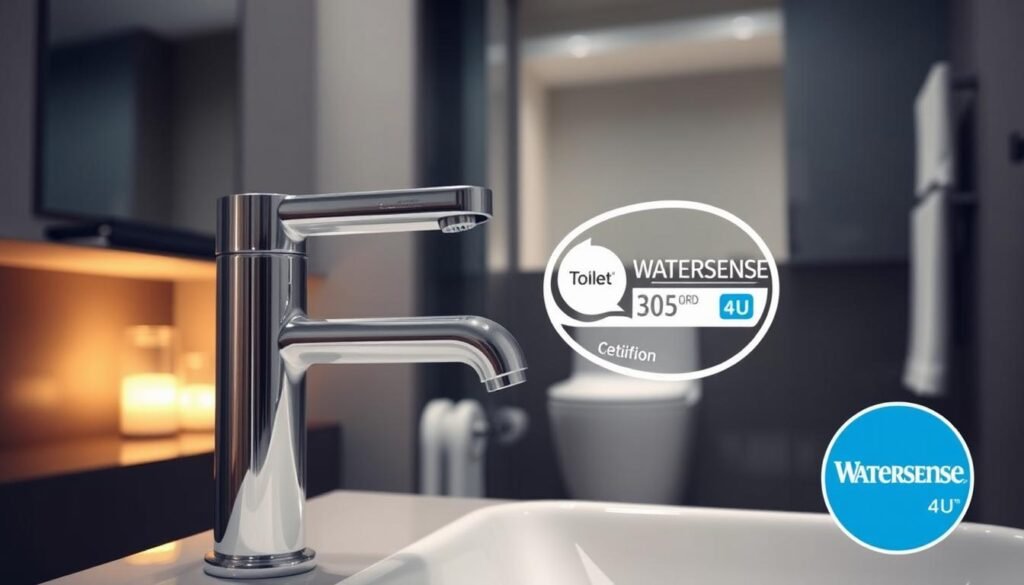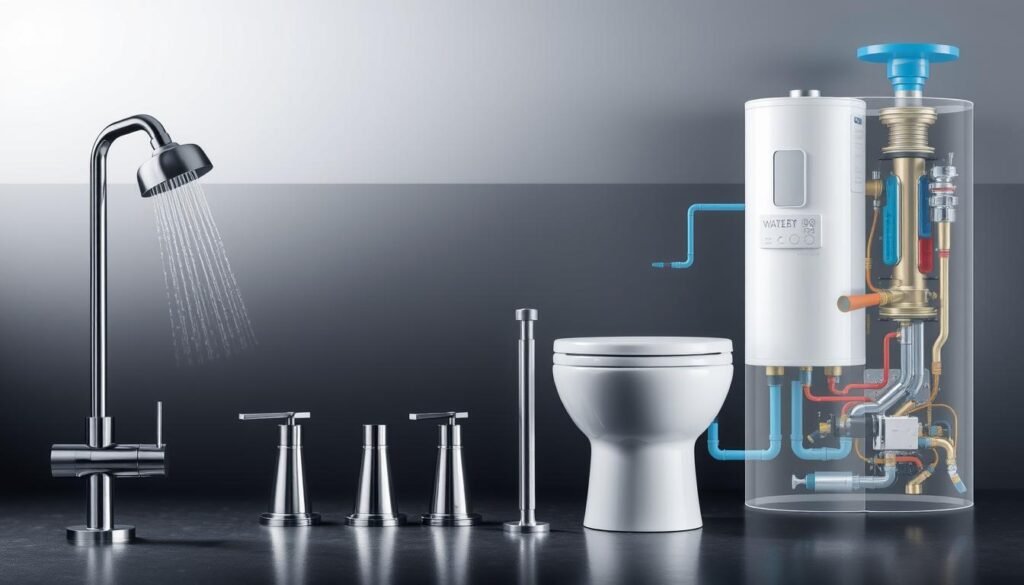Did you know the average American household wastes nearly 10,000 gallons of water each year? This is due to leaks alone. With water rates increasing by 5-8% yearly in many California areas, leaks and inefficient fixtures are costing you money.
At Local Plumbers 4 U, we’ve helped many homeowners in the Inland Empire save water. Our clients often see their water bills drop by 20-30% after we make changes.
Today’s water-saving technologies are advanced. They work well while using much less water. Whether you live in Riverside County, San Bernardino, Corona, or elsewhere in the Inland Empire, our team can find the best green plumbing solutions for you.
Commercial property owners can save even more. Big efficiency improvements can bring in a lot of money. Plus, many upgrades can get you tax incentives and utility rebates to help pay for them.
Want to start saving? Call us at 909-378-9322 for a personalized look at how you can save water.
Key Takeaways
- The average home wastes thousands of gallons annually through inefficient fixtures and leaks
- Water-saving upgrades can reduce your utility bills by up to 30%
- Modern eco-friendly fixtures maintain performance while using significantly less water
- Commercial properties can achieve substantial ROI through efficiency improvements
- Many water conservation upgrades qualify for tax incentives and utility rebates
- Local Plumbers 4 U serves the entire Inland Empire region with sustainable solutions
Overview of Energy-Efficient Plumbing Upgrades
Energy-efficient plumbing upgrades are a smart choice for a sustainable home. They offer big savings on utility bills and boost your home’s appeal. Many focus on kitchen remodels or painting, but plumbing upgrades are just as valuable.
These upgrades use new tech to save water and energy. They make your home more efficient and comfortable.
What Are Energy-Efficient Plumbing Upgrades?
These upgrades are designed to use less water and energy. They work just as well as standard fixtures but save more. They’re key to a greener home.
Look for the WaterSense label on products. It means they meet EPA standards for water savings. It’s your guarantee of quality and efficiency.

- Smart leak detection technology that alerts you to hidden water waste
- Pressure-regulating valves that optimize water flow
- Insulated pipes that minimize heat loss in hot water lines
- Greywater recycling systems that reuse water from sinks and showers
- High-efficiency water heaters that reduce energy consumption
Benefits of Energy-Efficient Plumbing for Homeowners
Energy-efficient plumbing saves money and water. You can cut your water bills by 15-30% with the right fixtures.
Energy bills also drop with efficient water heating. Water heating is a big part of home energy use. Upgrades here can save a lot.
| Fixture Type | Standard Usage | Efficient Usage | Potential Savings |
|---|---|---|---|
| Toilet | 3.5+ gallons/flush | 1.28 gallons/flush | Up to 60% |
| Showerhead | 2.5+ gallons/minute | 1.5 gallons/minute | Up to 40% |
| Faucet | 2.2+ gallons/minute | 1.5 gallons/minute | Up to 30% |
| Water Heater | Standard tank | Tankless/on-demand | Up to 35% |
These upgrades also increase your home’s value. Homes with these features sell for 2-5% more. In areas like the Inland Empire, they’re even more valuable.
They also help the environment. By using less water, you save local water supplies and energy. A typical home can save over 10,000 gallons a year.
Common Energy-Efficient Installations
Several upgrades are effective for improving efficiency. Energy-efficient plumbing solutions include simple replacements and major overhauls.
Low-flow toilets are a big impact. They cut indoor water use by nearly 30%. They use new tech to flush efficiently with less water.
Smart leak detection systems are another key tool. They watch for leaks and alert you. Some can even turn off your water supply.
Tankless water heaters are another great choice. They heat water only when needed. This can save 20-30% on water heating costs.
“The most effective water conservation strategy combines efficient fixtures with smart usage habits and regular maintenance to prevent leaks.”
Local Plumbers 4 U suggests a full system check. Their experts can find the best upgrades for your home. They’ll make sure you get the most savings.
Getting professionals to install your upgrades is key. They ensure everything works right from the start. With their help, you can plan a customized upgrade plan that fits your budget and goals.
Cost-Effective Plumbing Solutions for Your Home or Business
Investing in energy-efficient plumbing can cut down your utility bills and boost your property’s value. Modern plumbing technology has made big strides, helping you save water and energy without losing performance. These upgrades are good for the planet and can save you money every month.
Let’s look at the most impactful and cost-effective plumbing solutions today. They offer great returns on investment and make your property more efficient.
Water-Saving Fixtures: Faucets and Showerheads
Today’s low-flow fixtures are much better than old ones. They use new technology to keep water pressure strong while using up to 50% less water.
Aerators and flow restrictors are key to these efficient fixtures. They mix air with water for a steady, powerful stream that feels substantial but uses less water. For example, standard showerheads use 2.5 gallons per minute (GPM). WaterSense-certified models use no more than 2.0 GPM, and some use even less.

When buying water-saving fixtures, look for the WaterSense label. It means the product meets EPA standards for efficiency and performance. These fixtures are great for areas with water scarcity or high water costs.
“The average family can save nearly 40,000 gallons of water per year by installing water-efficient fixtures and appliances. That’s enough water to fill a backyard swimming pool.”
Installing most water-saving fixtures is easy and can be done in under an hour per fixture. Many homeowners can do it themselves, making these upgrades accessible energy-efficient plumbing upgrades for your home.
| Fixture Type | Standard Usage | Low-Flow Usage | Annual Savings (Family of 4) | Typical ROI Timeline |
|---|---|---|---|---|
| Bathroom Faucet | 2.2 GPM | 1.5 GPM | 11,000 gallons | 6-12 months |
| Kitchen Faucet | 2.2 GPM | 1.8 GPM | 5,500 gallons | 8-14 months |
| Showerhead | 2.5 GPM | 1.75 GPM | 14,000 gallons | 4-8 months |
| Handheld Shower | 2.5 GPM | 1.5 GPM | 18,250 gallons | 3-6 months |
High-Efficiency Toilets: Save Water and Money
Toilets are the biggest water users in homes, making up nearly 30% of indoor water use. Upgrading to high-efficiency models can greatly reduce water use and bills.
Modern high-efficiency toilets use as little as 1.28 gallons per flush (GPF). This is a big drop from older models that use 3.5 to 7 gallons. For a family of four, this can save up to 16,500 gallons of water a year, leading to big savings on water bills.
When looking at high-efficiency toilet options, you’ll find several technologies:
- Dual-flush toilets – Offer two flush options: a reduced volume for liquid waste and a full volume for solid waste
- Pressure-assisted models – Use compressed air to enhance flushing power while using less water
- Gravity-fed high-efficiency toilets – Redesigned to maximize flush performance with minimal water
High-efficiency toilets might cost a bit more upfront than standard models. But most homeowners see a return on investment in 1-2 years through lower water bills. Many water districts also offer rebates for these water-saving fixtures, improving your return even more.
Tankless Water Heaters: Efficient Hot Water Solutions
Traditional water heaters waste energy by constantly heating and reheating water in a tank. Tankless water heaters, on the other hand, heat water only when you need it, saving energy.
These systems offer several advantages:
- Energy savings of 24-34% for homes using less than 41 gallons of hot water daily
- Endless hot water supply without the wait for a tank to refill and reheat
- Longer lifespan (20+ years compared to 10-15 for conventional tanks)
- Space-saving design that frees up valuable square footage
While tankless water heaters cost more upfront, their energy efficiency and longer life make them a smart choice. Most homeowners see a positive return on investment in 7-10 years, depending on usage and local rates.
When installing, consider the right size for your household’s hot water needs. You might also need to upgrade gas lines or electrical systems. A qualified plumber ensures your system is correctly sized and installed for the best performance.
Smart Irrigation Systems: Optimize Outdoor Water Use
Outdoor water use can be a big part of your water bill, using 30-70% of residential water. Smart irrigation systems help by delivering the right amount of water exactly when and where it’s needed.
These systems use several water-saving technologies:
- Weather-based controllers – Adjust watering schedules based on local weather conditions
- Soil moisture sensors – Prevent watering when the soil already contains adequate moisture
- Drip irrigation – Delivers water directly to plant roots, minimizing evaporation
- Rain harvesting components – Collect and store rainwater for landscape use
Smart irrigation can cut outdoor water use by 20-50% while keeping your landscape healthy. Many systems can be controlled via smartphone apps, letting you adjust irrigation from anywhere.
For even more efficiency, consider greywater recycling systems. They capture and filter water from showers, sinks, and washing machines for irrigation. These systems can save thousands of gallons a year and reduce the strain on municipal water supplies.
| Upgrade Type | Initial Cost Range | Annual Savings | Environmental Impact | Installation Complexity |
|---|---|---|---|---|
| Low-Flow Fixtures | $20-$200 | $100-$300 | High | Low (DIY possible) |
| High-Efficiency Toilets | $150-$600 | $90-$230 | Very High | Medium |
| Tankless Water Heaters | $1,000-$3,000 | $80-$250 | Medium | High (Professional) |
| Smart Irrigation | $300-$2,500 | $200-$600 | Very High | Medium-High |
These cost-effective plumbing solutions offer both immediate and long-term benefits. They save money, improve performance, increase property value, and help the environment. Whether you’re a homeowner or business owner, these upgrades are smart investments in efficiency and sustainability.
Frequently Asked Questions about Plumbing Upgrades
Making smart decisions about your plumbing system can save water, energy, and money. Here are answers to the most common questions we receive from homeowners and business owners throughout Riverside County and the Inland Empire.
How Can I Improve Energy Efficiency in My Plumbing?
Start with simple fixes like repairing leaky faucets and installing aerators. Using water responsibly ensures this valuable resource is available for future generations while reducing your utility bills. For homes in Corona CA and San Bernardino dealing with hard water, installing a water softener can extend the life of your plumbing fixtures and improve efficiency.
What Upgrades Provide the Best ROI?
High-efficiency fixtures like low-flow showerheads and faucets typically pay for themselves within 6-12 months. Tankless water heaters offer significant long-term savings by heating water on demand without a storage tank. Smart irrigation systems are ideal for properties throughout the Inland Empire, where they can cut outdoor water usage by up to 50%. Call Local Plumbers 4 U at 909-378-9322 for a personalized assessment of which upgrades will give you the best return.
Are Energy-Efficient Upgrades Expensive?
Many water-saving upgrades are surprisingly affordable. Basic fixtures like high-efficiency faucets start under $100, while more extensive solutions like tankless water heaters range from $1,000-$3,000 installed. Local water districts in Riverside County often offer rebates that can offset these costs. Visit localplumbersincorona.com to learn about current incentives and financing options that make these upgrades budget-friendly for both homes and businesses.
